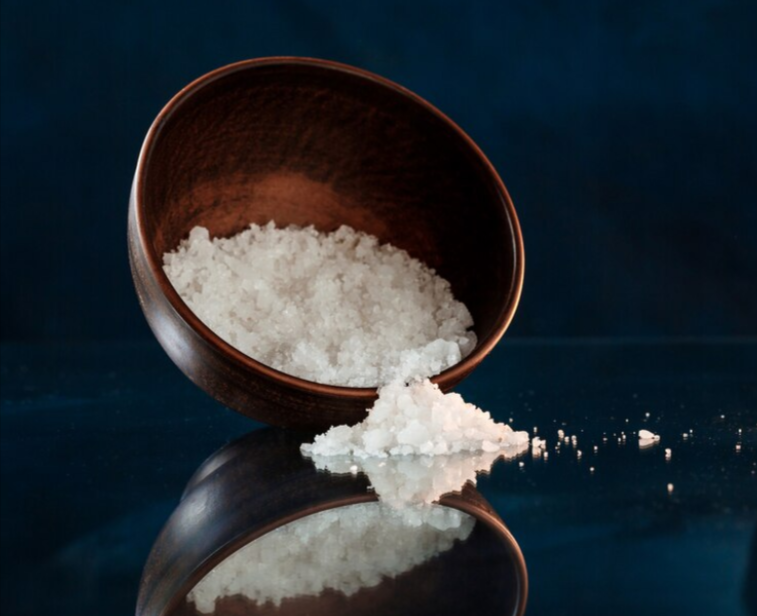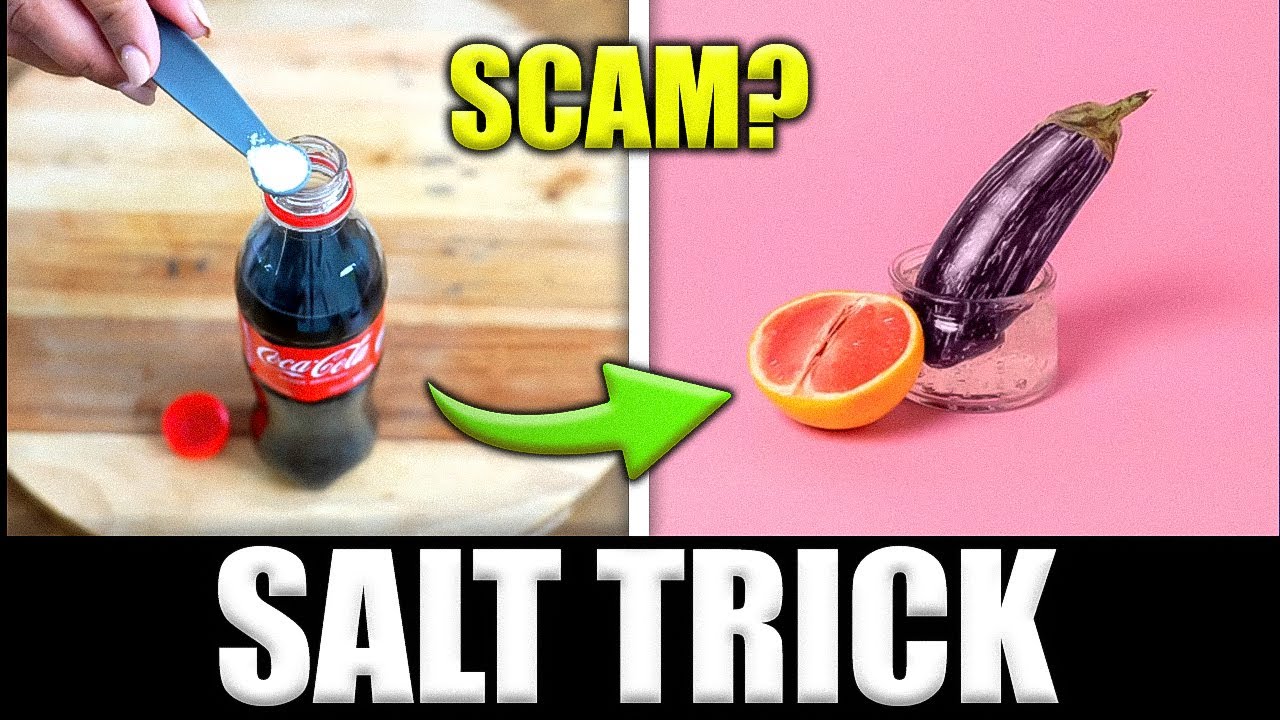Is The Salt Trick Real Or Fake? The Ultimate Truth You've Been Waiting For
Let’s cut to the chase, folks. The so-called "salt trick" has been making waves across the internet, and it’s time we clear the air. Whether you’re skeptical or genuinely curious, this article will deep dive into the science, myths, and facts surrounding this phenomenon. So buckle up, because we’re about to uncover whether the salt trick is real or fake!
Now, you might be thinking, "What even is the salt trick?" Well, it’s not just some random kitchen hack—it’s actually a widely discussed method people claim can solve everything from cleaning pennies to removing stains. But is it all it’s cracked up to be? Or is it just another internet fad? That’s what we’re here to find out.
Before we get into the nitty-gritty, let’s establish one thing: the salt trick is not just about sprinkling salt on your food. It’s about using this humble kitchen staple in unconventional ways. But does it really work? Stick around, because we’re about to spill the tea—or should I say, the salt?
What Exactly Is the Salt Trick?
Alright, let’s start with the basics. The salt trick refers to the idea of using salt for purposes beyond its traditional role as a seasoning. People have been experimenting with it for years, claiming it can do everything from cleaning grime to neutralizing odors. But does it live up to the hype?
For instance, one popular version of the salt trick involves using salt to clean tarnished silverware. Another suggests sprinkling it on stains to absorb grease. Sounds impressive, right? But before you start tossing salt around your house, let’s break it down.
Why Salt? The Science Behind It
Salt isn’t just a seasoning—it’s a chemical compound with some pretty cool properties. Its abrasive texture makes it an effective cleaner, while its ability to absorb moisture can help with stain removal. But here’s the kicker: not all salt tricks are created equal.
Some methods are backed by science, while others are pure myth. For example, did you know that salt can actually help in removing odors? That’s because it absorbs moisture, which often carries unpleasant smells. But when it comes to things like cleaning electronics or removing permanent marker stains, the results might not be as impressive.
Is the Salt Trick Real or Fake? Let’s Investigate
Now, let’s address the million-dollar question: is the salt trick real or fake? The answer, my friends, is a mix of both. Some applications of the salt trick are legit and can save you a lot of time and effort. Others, however, are nothing more than urban legends.
For example, using salt to clean your oven is a real and effective method. Sprinkle some salt on spills, let it sit, and voilà—clean oven. On the other hand, the idea of using salt to fix a cracked phone screen? Yeah, that’s pure fiction.
Top 5 Real Salt Tricks You Should Know
Let’s focus on the real stuff. Here are five salt tricks that actually work:
- Clean Tarnished Silver: Mix salt with vinegar and lemon juice to create a DIY silver polish. Rub it on your silverware, and watch it shine like new.
- Remove Stains: Sprinkle salt on fresh stains to absorb grease and oil. It’s a lifesaver for spills on clothes or carpets.
- De-ice Windshields: Create a saltwater solution and spray it on your car windows to melt ice quickly.
- Neutralize Odors: Place a bowl of salt in your fridge or pantry to absorb unpleasant smells. It’s a natural and chemical-free solution.
- Unclog Drains: Pour a mixture of salt, baking soda, and vinegar down the drain to break up clogs naturally.
Common Myths About the Salt Trick
Not everything you read online is true, folks. Here are some common myths about the salt trick that need debunking:
Myth #1: Salt Can Fix Broken Glass
Sorry to burst your bubble, but sprinkling salt on a cracked glass won’t magically repair it. While salt has some amazing properties, mending broken glass is not one of them.
Myth #2: Salt Can Remove Permanent Marker Stains
This one’s a no-go as well. While salt is great at absorbing grease, it doesn’t have the power to lift permanent marker stains. For that, you’ll need something stronger, like rubbing alcohol.
Myth #3: Salt Can Clean Electronics
Using salt to clean your electronics? Bad idea. Salt is abrasive and can damage sensitive surfaces. Stick to microfiber cloths and gentle cleaners for your tech gadgets.
The Benefits of Using the Salt Trick
Despite the myths, there are plenty of benefits to using the salt trick. First and foremost, it’s a natural and eco-friendly solution. No harsh chemicals, no synthetic ingredients—just good old salt.
Additionally, it’s cost-effective. You probably already have salt in your kitchen, so why not put it to good use? Plus, it’s versatile. From cleaning to de-icing, the possibilities are endless.
How to Use the Salt Trick Safely
While the salt trick is generally safe, there are a few precautions you should take:
- Always test a small area first to ensure it won’t damage the surface.
- Avoid using salt on delicate or porous materials, as it can cause discoloration.
- Wear gloves if you’re dealing with large quantities of salt to protect your skin.
Expert Opinions on the Salt Trick
According to Dr. Sarah Thompson, a chemist specializing in household cleaning methods, "Salt is an incredibly versatile substance, but it’s important to use it wisely. While it can tackle many cleaning challenges, it’s not a one-size-fits-all solution."
Similarly, renowned home cleaning expert Jane Roberts advises, "When in doubt, start small. The salt trick is powerful, but it’s not magic. Use it where it makes sense, and you’ll be amazed at the results."
Real-Life Success Stories
Don’t just take our word for it. Here are some real-life success stories from people who’ve tried the salt trick:
- “I used the salt trick to clean my oven, and it worked like a charm! No more harsh chemicals or expensive cleaners.” – Sarah L.
- “Sprinkling salt on my carpet stain saved me a trip to the dry cleaner. It’s a game-changer!” – Mark T.
The Science Behind Salt’s Cleaning Power
So, why is salt such an effective cleaner? It all comes down to its physical and chemical properties. Salt is abrasive, which makes it great for scrubbing away grime. It’s also hygroscopic, meaning it attracts and absorbs moisture. This property is what makes it so effective at neutralizing odors and removing stains.
Additionally, salt reacts with certain acids, like vinegar and lemon juice, to create a cleaning powerhouse. This reaction can break down tough stains and tarnish, leaving surfaces looking brand new.
Conclusion: Is the Salt Trick Worth Trying?
In conclusion, the salt trick is a mix of real science and urban legend. While not every claim about it holds up under scrutiny, there are plenty of legitimate uses that make it worth trying. From cleaning silverware to de-icing windshields, the salt trick can save you time, money, and effort.
So, what are you waiting for? Grab that salt shaker and start experimenting. And don’t forget to share your results with us in the comments below. Who knows? You might just discover the next big salt trick!
Table of Contents
- What Exactly Is the Salt Trick?
- Why Salt? The Science Behind It
- Is the Salt Trick Real or Fake? Let’s Investigate
- Top 5 Real Salt Tricks You Should Know
- Common Myths About the Salt Trick
- The Benefits of Using the Salt Trick
- How to Use the Salt Trick Safely
- Expert Opinions on the Salt Trick
- The Science Behind Salt’s Cleaning Power
- Conclusion: Is the Salt Trick Worth Trying?
Mom And His Kid CCTV: The Ultimate Guide To Parental Surveillance
RemoteIoT Platform: The Ultimate Game-Changer For Modern Connectivity
Mastering Remote IoT VPC SSH Download Windows 10: A Comprehensive Guide

Salt Trick Real or Fake? Find Out Here

Is The Salt Trick Fake? Unveiling The Truth Behind This Popular Myth

Is The Salt Trick A Scam? Truth Revealed